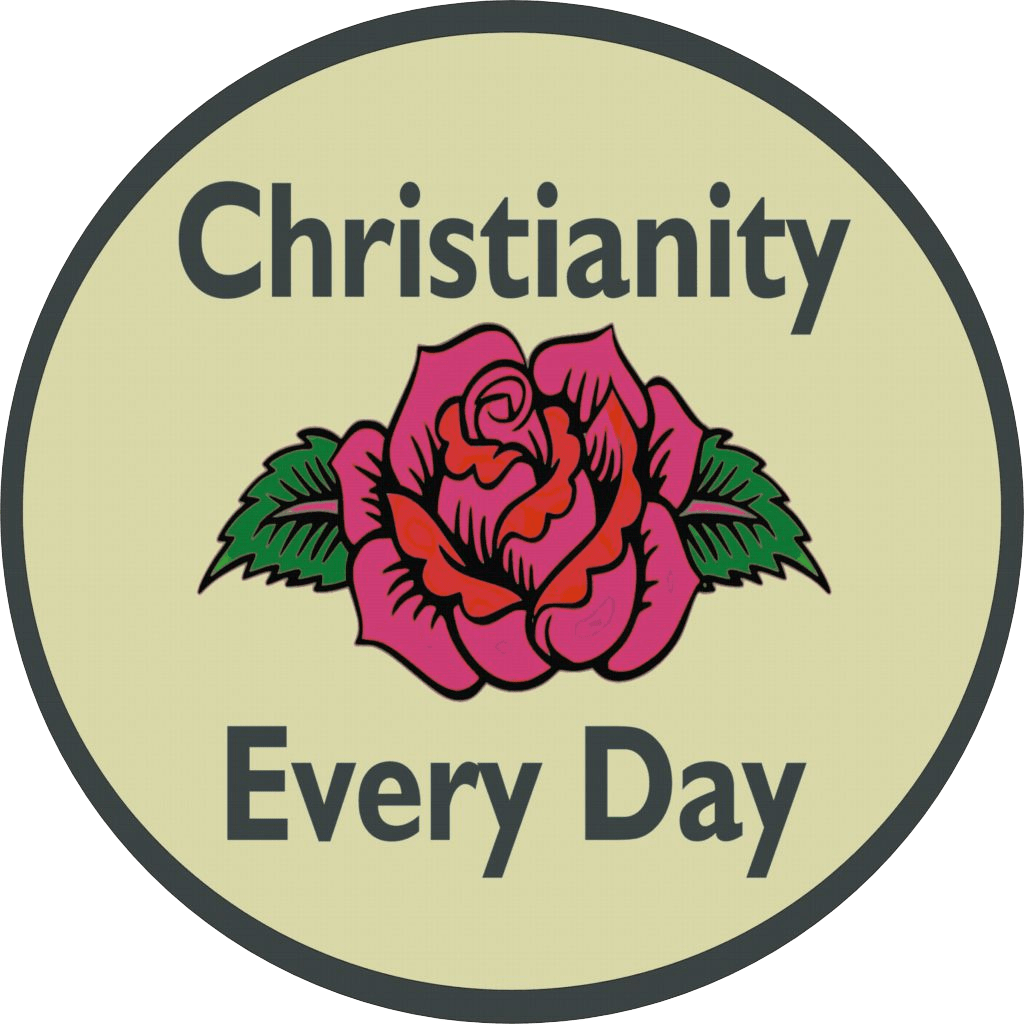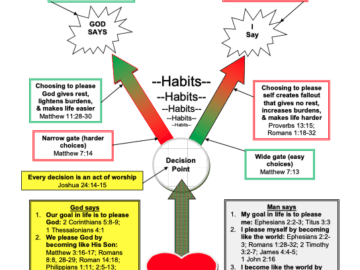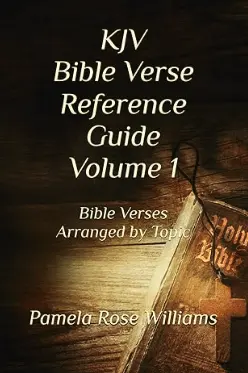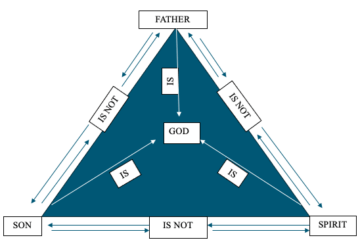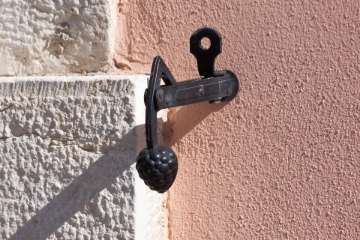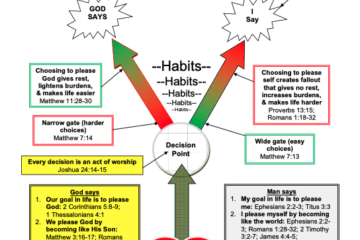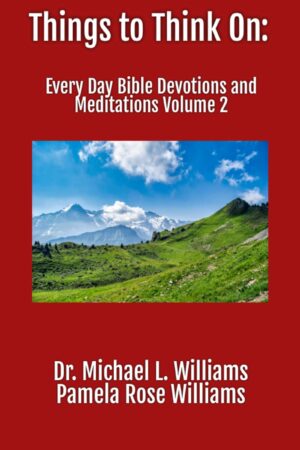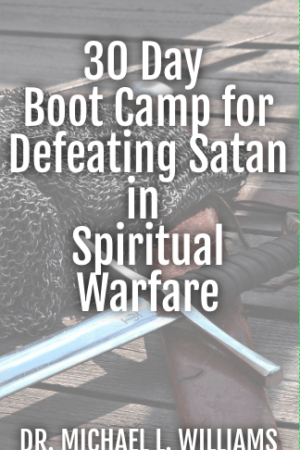Do we have a helping or hurting influence on others?
Each of us are born as babies into a world that has great influence on us. As we grow and interact with the world, we begin to influence others, and they influence us. At some point, as those that love the Lord, we should ask ourselves, do we have a helping or hurting influence on others?
Jesus teaches us about helping and hurting influences on others
In Mark 9:33-38, Jesus and the disciples came into Capernaum after He told His disciples He would be crucified. They did not understand and did not ask Him any questions but instead started having a dispute about who was first in the group. Jesus addressed the dispute by teaching them a lesson about how those that would be first would also be last. Using the example of a child, Jesus told them whoever humbles himself to receive the child in His name, receives Him and God the Father. This set the topic of the conversation to be about interacting with others.
Jesus teaches us about the influence of our speech
After He said this, John then told Jesus that they saw someone casting out devils in His name. He said that the person did not follow them, so they forbade them from casting out devils. Jesus responded as follows:
Mark 9:39-40. “But Jesus said, Forbid him not: for there is no man which shall do a miracle in my name, that can lightly speak evil of me. 40 For he that is not against us is on our part.”
Jesus told them that if someone is doing a miracle in His name, they should not forbid them from doing it. He added that no one doing a miracle in His name can speak evil of Him. The Apostle Paul made mention of this later when comes to the Spiritual gifts given to believers as follows:
1 Corinthians 12:1-7. Now concerning spiritual gifts, brethren, I would not have you ignorant. 2 Ye know that ye were Gentiles, carried away unto these dumb idols, even as ye were led. 3 Wherefore I give you to understand, that no man speaking by the Spirit of God calleth Jesus accursed: and that no man can say that Jesus is the Lord, but by the Holy Ghost. 4 Now there are diversities of gifts, but the same Spirit. 5 And there are differences of administrations, but the same Lord. 6 And there are diversities of operations, but it is the same God which worketh all in all. 7 But the manifestation of the Spirit is given to every man to profit withal.“
We see here that what we say can provide opportunities to get to know people and use the gifts God gives us to help them. Then, as we spend time helping them, we can get to know them better. This leads us to being able to talk with them about God’s power to change our lives for the better. This is also when we can share stories of how we or other believers have overcome difficult life issues by helping one another.
Jesus teaches us about the influence of our actions
Because of our service to them and getting to know each other, we can often learn about their needs for help in their life. It may be something we can personally help with or share with them our knowledge of someone that might be able to help. In many cases, it might be personal issues or issues that impact their ability to live.
An example of this might be a case where they have encountered an unexpected financial issue and need help. Sometimes it might be us helping them to get in touch with an individual or organization that can help. Other times, it might be a case of them needing some income and we offer to help provide some funds as a gift. Or it may be that we know of someone that is looking to hire someone for a job that the person in need can do. In any case, our focus is to bless them with help without any expectation of return out of a motivation of our love for Christ and belonging to Him as follows:
Mark 9:41. “For whosoever shall give you a cup of water to drink in my name, because ye belong to Christ, verily I say unto you, he shall not lose his reward.”
We see Jesus mentioned how there is also rewards given to those serving others. Paul spoke of this along with our motivation and focus of why we do it as follows:
1 Corinthians 3:8-11. “Now he that planteth and he that watereth are one: and every man shall receive his own reward according to his own labour. 9 For we are labourers together with God: ye are God’s husbandry, ye are God’s building. 10 According to the grace of God which is given unto me, as a wise masterbuilder, I have laid the foundation, and another buildeth thereon. But let every man take heed how he buildeth thereupon. 11 For other foundation can no man lay than that is laid, which is Jesus Christ.”
We learn here that as we work together, we should do it in ways that meet God’s high standards. We may know that we will receive rewards, but our focus should be that God has built us up and given us the grace we need to do it to benefit others. This motivates us to place importance on the actions we take and how they should be done based the example of Jesus Christ alone and nothing else.
Jesus teaches us about our influence on children
Since Jesus started the conversation using the example of a child, He added to what He said and how He felt about our influences on children. He was very direct about what He said as follows:
Mark 9:42. “And whosoever shall offend one of these little ones that believe in me, it is better for him that a millstone were hanged about his neck, and he were cast into the sea.”
Jesus was very serious about not doing anything to offend a child that believes in Him. He warned that the consequence would not be a reward we like. In fact, He compared the consequence to having a millstone tied around our neck and drowned. We see this also mentioned and explained in Matthew 18 with more detail about how the Lord feels about harming children as follows:
Matthew 18:1-6. “At the same time came the disciples unto Jesus, saying, Who is the greatest in the kingdom of heaven? 2 And Jesus called a little child unto him, and set him in the midst of them, 3 And said, Verily I say unto you, Except ye be converted, and become as little children, ye shall not enter into the kingdom of heaven. 4 Whosoever therefore shall humble himself as this little child, the same is greatest in the kingdom of heaven. 5 And whoso shall receive one such little child in my name receiveth me. 6 But whoso shall offend one of these little ones which believe in me, it were better for him that a millstone were hanged about his neck, and that he were drowned in the depth of the sea.”
Matthew 18:10, 14. “Take heed that ye despise not one of these little ones; for I say unto you, That in heaven their angels do always behold the face of my Father which is in heaven.”…”14 Even so it is not the will of your Father which is in heaven, that one of these little ones should perish.”
Jesus warns us about the danger of offending children
If anyone has ever seen a millstone, it is a large heavy circular stone with a hole in the middle used to grind grains into a flour or powder. It is very clear that such a stone would not only drown us, but if tied around our neck, it would break our neck and take us to the bottom of the sea in no time.
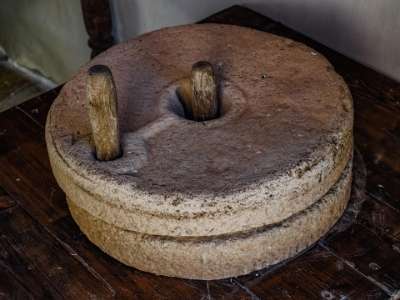
Pictured above: flat millstone
We find another example of the consequence of what happens when something is done that has a bad influence on children as follows:
Numbers 20:7-13. “And the LORD spake unto Moses, saying, 8 Take the rod, and gather thou the assembly together, thou, and Aaron thy brother, and speak ye unto the rock before their eyes; and it shall give forth his water, and thou shalt bring forth to them water out of the rock: so thou shalt give the congregation and their beasts drink. 9 And Moses took the rod from before the LORD, as he commanded him. 10 And Moses and Aaron gathered the congregation together before the rock, and he said unto them, Hear now, ye rebels; must we fetch you water out of this rock? 11 And Moses lifted up his hand, and with his rod he smote the rock twice: and the water came out abundantly, and the congregation drank, and their beasts also. 12 And the LORD spake unto Moses and Aaron, Because ye believed me not, to sanctify me in the eyes of the children of Israel, therefore ye shall not bring this congregation into the land which I have given them. 13 This is the water of Meribah; because the children of Israel strove with the LORD, and he was sanctified in them.”
Moses suffered loss because his influence hurt children
We see here that Moses was leading the Israelites, and they were in need of water. The LORD told Moses to gather them all together and to speak to a specific rock to bring forth water, and it would provide water to them. Moses did as he was told until it came time to speak to the rock. Moses turned it into an insult when he called the Israelites rebels and asked, “Must we fetch you water out of this rock?” Moses said it in a way that was insulting and then he struck the rock twice with his rod instead of speaking to it.
The problem was not only that Moses insulted the crowd, he ignored what God had said to do and struck the rock with the rod. Without getting into the miracles of the rod being used to part the Red Sea, we see several problems here that caused God to curse Moses with a drastic consequence. Earlier, God had promised Moses that he could lead the Israelites into the Promised Land. Because of what Moses did in front of the children of Israel, the consequence was not a millstone. Instead, Moses was cursed with being forbidden from entering the Promised Land with the Israelites and died not long after. God then called Joshua to lead them.
There is a lot of symbolism when it comes to this rock and how it was related to children of Israel in verses 12-13. However, the fact is that this rock was also a representation of God. Therefore, speaking to it should have been symbolic of speaking to God and God providing for our needs. However, Moses destroyed that symbolism and lost his reward because of the influence he had on the children.
We must positively help influence children to love the Lord
We learn here that when it comes to children, we must be extra diligent to make sure that our influences help them to grow in the nurture and admonition of the Lord as follows:
Ephesians 6:1-4. “Children, obey your parents in the Lord: for this is right. 2 Honour thy father and mother; (which is the first commandment with promise;) 3 That it may be well with thee, and thou mayest live long on the earth. 4 And, ye fathers, provoke not your children to wrath: but bring them up in the nurture and admonition of the Lord.”
This means we must raise children and teach them in ways the Lord tells us. This includes everything that we expose them to; how we talk to them; how we provide a Godly home for them; and how they are educated. For more information on how to do these things with children, check out our article on homeschooling children that includes these other areas of parenting:
Why do some Christians homeschool their children?
What efforts must we take to stop our hurting influences?
We see that what we say, what we do, and the maturity of who we influence is very important. We can also see that what we say has an effect. Doing something has more of an effect and the things we say and do to children has a huge effect. Without getting into all the effects of parenting, it is no secret that the way children are raised has a big impact. It impacts their childhood. It impacts who they become as adults and impacts how they raise any children they might have.
We must treat hurting influences like a bad infection
Like a flu, our influences can infect the whole world like a pandemic. Historically we know that many civilizations in history have collapsed within a few generations, when bad influences destroy the culture. This always has a destructive impact on families as children are raised in a rebellious culture. Considering what we find in Scripture about Godless civilizations, it is no surprise that God calls for us to take extreme measures to stop bad influences. Picking up on what God said would happen with a millstone to those that are a bad influence on children, He tells us the following:
Mark 9:43-48. “And if thy hand offend thee, cut it off: it is better for thee to enter into life maimed, than having two hands to go into hell, into the fire that never shall be quenched: 44 Where their worm dieth not, and the fire is not quenched. 45 And if thy foot offend thee, cut it off: it is better for thee to enter halt into life, than having two feet to be cast into hell, into the fire that never shall be quenched: 46 Where their worm dieth not, and the fire is not quenched. 47 And if thine eye offend thee, pluck it out: it is better for thee to enter into the kingdom of God with one eye, than having two eyes to be cast into hell fire: 48 Where their worm dieth not, and the fire is not quenched.” 49 For every one shall be salted with fire, and every sacrifice shall be salted with salt. 50 Salt is good: but if the salt have lost his saltness, wherewith will ye season it? Have salt in yourselves, and have peace one with another.
We must focus on three areas of being a helping influence
We see that God does not take making these changes lightly. He tells us that if our hands, feet, or eyes offend us, then to get rid of them. While this is very drastic, what He is telling us is that we must not physically do things, go places, nor watch things that cause our behaviors to become ungodly. He tells us it is better to take drastic action to change our ways than be cast into the fire of Hell. God concludes by saying that these drastic measures help us maintain our relationship and purity with God and each other as follows:
Mark 9:49-50. “For every one shall be salted with fire, and every sacrifice shall be salted with salt. 50 Salt is good: but if the salt have lost his saltness, wherewith will ye season it? Have salt in yourselves, and have peace one with another.”
We must honor God in our work, our travels, and what we see
This salt representation in verse 49 was very well known to Jesus’ disciples as they knew salt was used in meat offerings. These offerings represent a special covenant with God. Therefore, the drastic actions we take to change represent preservation and purity of our relationships with Him. (See Leviticus 2:13; Numbers 18:19; Ezra 6:9; and Ezekiel 43;24).
We must focus on changing three things to honor God:
- Things we do with our hands: It could be cutting off things we should not be doing for work or what we spend our time working on. It could be our overuse of technology or putting too much time and effort into doing things that take us away from the Lord’s work
- Things we do with our feet: It could be cutting off trips to places we go that we should not be going to. It may involve not going to places where bad behaviors take place. Or it could be walking away from helping people in need or even going somewhere else when we should be going to church
- Things we do with our eyes: It could be cutting off things we look at like too much television or the internet. Looking at pornographic materials and web sites must be avoided. It could even be cutting off looking at things we should not see that invades someone’s privacy. Or it might even be not spending time reading God’s Word and attending church classes or services.
Final thoughts
There is much more we can discuss. However, it comes down to us actively spending time with the Lord in where we go, who we spend time with, what we do, and our learning. Like salt, we must season everything we do with God’s Word; fellowship with other believers; and being active in a good Bible teaching church. This helps us to honor Him and be a helping influence on others for Him:
1 John 5:12-15. “He that hath the Son hath life; and he that hath not the Son of God hath not life. 13 These things have I written unto you that believe on the name of the Son of God; that ye may know that ye have eternal life, and that ye may believe on the name of the Son of God. 14 And this is the confidence that we have in him, that, if we ask any thing according to his will, he heareth us: 15 And if we know that he hear us, whatsoever we ask, we know that we have the petitions that we desired of him.”
May God bless us and keep us as we strive to have a helping and not a hurting influence on others so they too will learn to love God.

Dr. Michael L. Williams, Head of Ministry Operations and Technology at Christianity Every Day, is a Christ-centered Author, Educator, Biblical Counselor and Advisor. He is ordained in Pastoral Ministry and formerly the founding Pastor of Selah Mountain Ministries, a church started along with his wife, Pamela Rose, after several years of pastoral experience and training in Biblical Counseling. Selah Mountain provided Biblical counseling and education to the public on how to overcome life issues Biblically on topics such as anger management, marriage, addictions, and other subjects – often referred to as mental illnesses. To learn more about Dr. Mike visit the About page.
